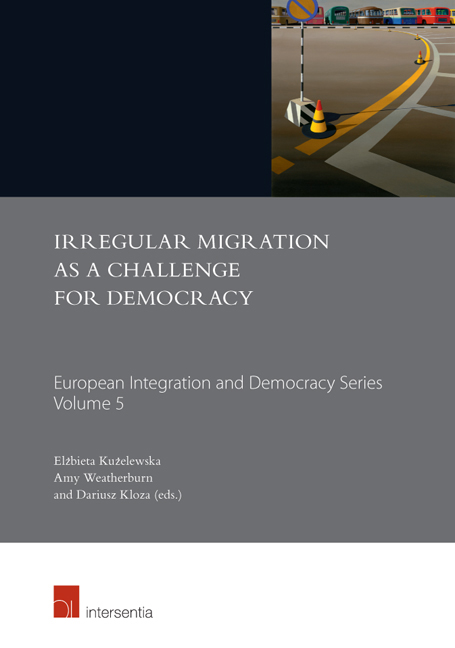Book contents
- Frontmatter
- Foreword
- Introduction
- Contents
- List of Abbreviations
- PART I The European Integration Project And Irregular Migration: Upholding Fundamental Values And Principles
- Part II Migrants, their Rights and the Limits Thereof
- Part III The Status Quo of Migration in Europe: Selected National Perspectives
- 10 The Governance of the Migrant Crisis in Italy (Invited Contribution)
- 11 The Impact of the Migration Crisis on Polish Immigration and Criminal Law
- 12 The Role of NGOs as Partners in Migration Management in Estonia: A Case Study
11 - The Impact of the Migration Crisis on Polish Immigration and Criminal Law
from Part III - The Status Quo of Migration in Europe: Selected National Perspectives
Published online by Cambridge University Press: 12 October 2018
- Frontmatter
- Foreword
- Introduction
- Contents
- List of Abbreviations
- PART I The European Integration Project And Irregular Migration: Upholding Fundamental Values And Principles
- Part II Migrants, their Rights and the Limits Thereof
- Part III The Status Quo of Migration in Europe: Selected National Perspectives
- 10 The Governance of the Migrant Crisis in Italy (Invited Contribution)
- 11 The Impact of the Migration Crisis on Polish Immigration and Criminal Law
- 12 The Role of NGOs as Partners in Migration Management in Estonia: A Case Study
Summary
INTRODUCTION
The increased criminalisation of migration over the past decade leaves open the question of whether this is an appropriate policy response or whether the resulting policies can be described as over-criminalisation. The immigration crisis in Europe, in addition to its social and humanitarian impact, has led to some legal consequences which are reflected in recent amendments to Polish immigration law. It must be noted that the example of Poland is not an exception when it comes to state responses to the perceived migration crisis. A very important regulation in question is the Act on Anti-terrorism, which was introduced in Poland on 10 June 2016, and gives the state licence to limit the rights of foreigners.
The main hypothesis presented in this chapter is that the amendments introduced into Polish law are disproportionate to the threat caused by immigration. The questions which will be discussed in this chapter are: (i) What is the scale of illegal migration to Poland? (ii) What is the scale of criminality attributable to foreigners in Poland? (iii) What are the latest amendments introduced into Polish immigration and criminal law to prevent the perceived threat? Drawing on the above, this chapter endeavours to answer whether the scale of illegal migration into Poland provides valid grounds for the introduction of the amendments to the law. Is it, for example, significant when compared with the situation in other European countries? What are the routes taken by immigrants to reach Europe and is Poland in fact ‘on their roadmap’? This chapter looks at the question of whether or not the legal amendments to Polish law in the field of immigration and criminal law are necessary and if so, whether they are proportional to the perceived threat posed by migration and the criminality of foreigners.
ILLEGAL MIGRATION TO POLAND
In 2015, European Union (EU) Member States reported more than 1,820,000 detections of illegal crossings along the EU's external borders to Frontex. This number, the highest recorded, was more than six times the number of detections reported in 2014, which in itself was an unprecedented year. There are eight established routes of illegal migration leading to the EU.
- Type
- Chapter
- Information
- Irregular Migration as a Challenge for Democracy , pp. 191 - 226Publisher: IntersentiaPrint publication year: 2018



